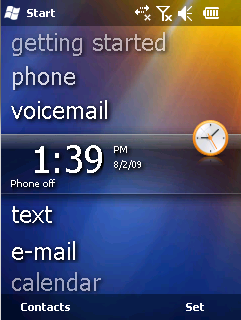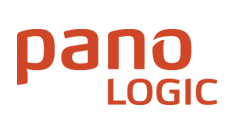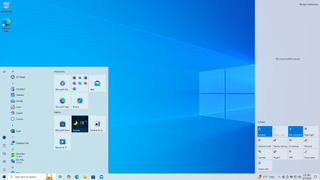Microsoft Windows is a product line of proprietary graphical operating systems developed and marketed by Microsoft. It is grouped into families and sub-families that cater to particular sectors of the computing industry – Windows (unqualified) for a consumer or corporate workstation, Windows Server for a server and Windows IoT for an embedded system. Defunct families include Windows 9x, Windows Mobile, Windows Phone, and Windows Embedded Compact.

Microsoft Office, or simply Office, is a family of client software, server software, and services developed by Microsoft. It was first announced by Bill Gates on August 1, 1988, at COMDEX in Las Vegas. Initially a marketing term for an office suite, the first version of Office contained Microsoft Word, Microsoft Excel, and Microsoft PowerPoint. Over the years, Office applications have grown substantially closer with shared features such as a common spell checker, Object Linking and Embedding data integration and Visual Basic for Applications scripting language. Microsoft also positions Office as a development platform for line-of-business software under the Office Business Applications brand.

Citrix Systems, Inc. is an American multinational cloud computing and virtualization technology company that provides server, application and desktop virtualization, networking, software as a service (SaaS), and cloud computing technologies. Citrix claims that their products are used by over 400,000 clients worldwide, including 99% of the Fortune 100 and 98% of the Fortune 500.

VMware LLC was an American cloud computing and virtualization technology company headquartered in Palo Alto, California. VMware was the first commercially successful company to virtualize the x86 architecture.

Windows Mobile is a discontinued mobile operating system developed by Microsoft for smartphones and personal digital assistants.
Microsoft Desktop Optimization Pack (MDOP) is a suite of utilities for Microsoft Windows customers who have subscribed to Microsoft Software Assurance program. It aims at bringing easier manageability and monitoring of enterprise desktops, emergency recovery, desktop virtualization and application virtualization.

Pano Logic was a manufacturer of devices which present virtual desktops to the end user with no local processing power. They describe this concept as "zero client". This is perceived as offering benefits in end-user support and in power provision to desks. OEM versions have been included in displays from some vendors, allowing a single unit to be deployed. The company failed in October 2012. In March 2013, Propalms announced they had acquired the rights to support Panologic customers, and will "help transition the customer base to a new platform".
InstallFree Inc. is a privately held company, backed by Ignition Partners and Trilogy Equity Partners, with headquarters in Stamford, CT and offices located worldwide. It was acquired by WatchDox. in December 2012. InstallFree specializes in Application Virtualization and delivery, based on their proprietary application virtualization technology that works on a variety of Microsoft Windows platforms such as Windows XP, Windows Vista, Windows 7, Windows Server 2003, Windows Server 2008, Terminal Server and Citrix XenApp.
Microsoft Intune is a Microsoft cloud-based unified endpoint management service for both corporate and BYOD devices. It extends some of the "on-premises" functionality of Microsoft Configuration Manager to the Microsoft Azure cloud.
Founded by Alex Vasilevsky, Virtual Computer was a venture-backed software company in the Boston area that produces desktop virtualization products, which combine centralized management with local execution on a hypervisor running on PCs. By running the workload on the PC, Virtual Computer enables companies to have centralized management without servers, storage, and networking required for server-hosted VDI.
Mobile application management (MAM) describes the software and services responsible for provisioning and controlling access to internally developed and commercially available mobile apps used in business settings, on both company-provided and 'bring your own' mobile operating systems as used on smartphones and tablet computers.

Windows RT is a mobile operating system developed by Microsoft. It is a version of Windows 8 or Windows 8.1 built for the 32-bit ARM architecture (ARMv7). First unveiled in January 2011 at Consumer Electronics Show, the Windows RT 8 operating system was officially launched alongside Windows 8 on October 26, 2012, with the release of three Windows RT-based devices, including Microsoft's original Surface tablet. Unlike Windows 8, Windows RT is only available as preloaded software on devices specifically designed for the operating system by original equipment manufacturers (OEMs).

The post-PC era was a market trend observed during the late 2000s and early 2010s involving a decline in the sales of personal computers (PCs) in favor of post-PC devices; which include mobile devices such as smartphones and tablet computers as well as other mobile computers such as wearable and ubiquitous ones. These devices emphasize portability and connectivity, including the use of cloud-based services, more focused "apps" to perform tasks, and the ability to synchronize information between multiple devices seamlessly.
There are, in essence, three kinds of Cloud printing.
Samsung Knox is a proprietary security and management framework pre-installed on most Samsung mobile devices. Its primary purpose is to provide organizations with a toolset for managing work devices, such as employee mobile phones or interactive kiosks. Samsung Galaxy hardware, as well as software such as Secure Folder and Samsung Wallet, make use of the Knox framework.

Teradici Corporation was a privately held software company founded in 2004, which was acquired by HP Inc. in October 2021. Teradici initially developed a protocol (PCoIP) for compressing and decompressing images and sound when remotely accessing blade servers, and implemented it in hardware. This technology was later expanded to thin clients/zero clients for general Virtual Desktop Infrastructure. Teradici's protocol or hardware is used by HP, Dell-Wyse, Amulet Hotkey, Samsung, Amazon Web Services, Fujitsu, and VMware.
A mobile workspace is a user's portable working environment that gives them access to the applications, files and services they need to do their job no matter where they are.

Windows 10 is a major release of Microsoft's Windows NT operating system. It is the direct successor to Windows 8.1, which was released nearly two years earlier. It was released to manufacturing on July 15, 2015, and later to retail on July 29, 2015. Windows 10 was made available for download via MSDN and TechNet, as a free upgrade for retail copies of Windows 8 and Windows 8.1 users via the Microsoft Store, and to Windows 7 users via Windows Update. Windows 10 receives new builds on an ongoing basis, which are available at no additional cost to users, in addition to additional test builds of Windows 10, which are available to Windows Insiders. Devices in enterprise environments can receive these updates at a slower pace, or use long-term support milestones that only receive critical updates, such as security patches, over their ten-year lifespan of extended support. In June 2021, Microsoft announced that support for Windows 10 editions which are not in the Long-Term Servicing Channel (LTSC) will end on October 14, 2025.
Citrix Virtual Apps is an application virtualization software produced by Citrix Systems that allows Windows applications to be accessed via individual devices from a shared server or cloud system.

Microsoft 365 is a product family of productivity software, collaboration and cloud-based services owned by Microsoft. It encompasses online services such as Outlook.com, OneDrive, Microsoft Teams, programs formerly marketed under the name Microsoft Office, enterprise products and services associated with these products such as Exchange Server, SharePoint, and Viva Engage. It also covers subscription plans encompassing these products, including those that include subscription-based licenses to desktop and mobile software, and hosted email and intranet services.








